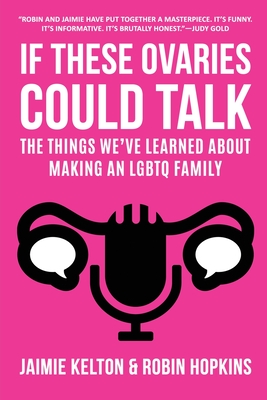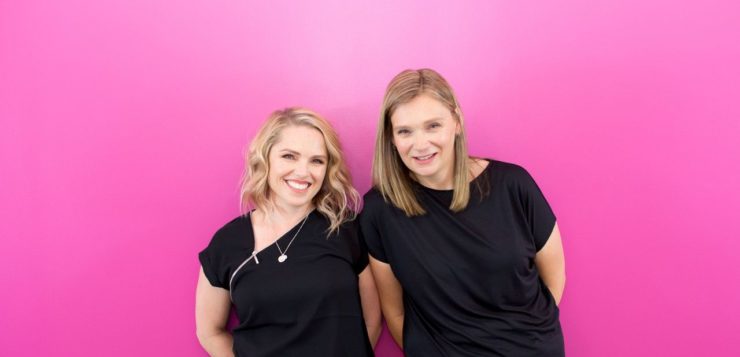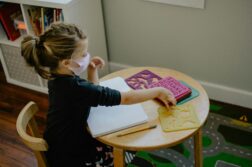
Disclosure is a really important word for LGBT families. When, where, and how we talk to our kids about where they come from requires intensive thought.
Jaimie and I are lesbian podcasters and business partners who each have wives and kids of our own. And despite talking regularly about LGBT families on air, we’ve both struggled with having “the talk” with our kids. Will we do it right? Will they want to talk about it? Will they be proud of their family or ashamed of our differences?
Our kids are too young to know how it all turns out, but here’s how it’s going so far.
Robin’s Story
My wife Mary and I always said we’d be open with our kids about our family story. It’s not like we were brave warriors, we knew we didn’t have a choice. Even if our kids weren’t smart, at some point they’d figure out one of us ladies was not a dad.
In the early days of parenting, we thought all we needed to do to address the situation was to use language like, “Some families have a dad and a mom, others have just a dad, and some families, like ours, have two moms.” And then we’d head to Universal Harry Potter and all would be right in the world.
That was our approach, and we felt like we were winning. Until our daughter, who was about three at the time, started yelling at strange men on the street, “That’s my daddy!” as she skipped toward them.
This was alarming because the first guy she approached was apparently homeless, but it was also surprising because of the timing. I knew we would have to deal with the fact that we were a two-mom family, but I figured that would be when our kids were in middle school, and they would be ashamed of us. Even then, I assumed the shame would be because we wear Old Navy jeans and free T-shirts from my day job.
So, when the moment arrived a decade early, Mary and I both knew we needed to up our game on the disclosure conversation, and fast. I went into action, picking out a book for two women who bought sperm on the Internet as easily as buying a bathing suit from J. Crew. I popped that bad boy into my cart and checked express shipping.
We decided to not make a big deal of it, and we put the book into rotation between Good Night Moon and our other family favorite, I Like It When…. We didn’t debate the points of the story or even chat about it with our daughter, but we read it each night before bed, and we were ready if she asked any questions. This felt like just the right amount of information for her age.
Over time, our daughter stopped mentioning a daddy. And two years later, I arrived at her elementary school to pick her up. When I walked into the classroom, I saw her happily playing with another girl. Her little friend saw me and speed-walked over, and said, “Does Maxine really have two moms?” Her tone wasn’t mean, but it was incredulous as if two moms were mathematically impossible.
I looked the little girl in the eye and said, “Of course she does.” The little girl made a face, shrugged her shoulders, and walked back to the play area. My daughter smiled, like the proudest girl in the whole world, because she was different, special even. Then she skipped over to me so we could head home.
We don’t think it will always be like this, but we hope that maybe, just maybe, it will.
Jaime’s Story
My kids are both young, so we haven’t had many conversations about their donor yet. We have a book that describes how two moms make babies. It’s rife with words like “sperm” and “ovaries,” and it’s packed with illustrations to boot. We bring it out regularly to read together at bedtime, but our oldest is more interested in reading about kitty cats and unicorns than sperm banks and doctors, and I don’t blame her.
Experts have said that kids ask questions when they’re ready to hear the answers, and we trust the experts, so we’re following our children’s lead on this one. We make a point of affirming to them how lucky they are to have two moms, and we have every children’s book on our shelves ever written about kids who have two moms, and we do our best to read to them whenever they’ll let us. But, we mostly read about kitty cats—cats in space suits, cats who practice magic, cats who fly or dance. You get the picture.
There was that one time, though, when Rose insisted that our not-so-friendly cab driver was her dad. He was not amused, but she proclaimed it loud and proud, over and over again, just to make sure he heard. I think he might have been less unhinged by Rose’s declarations than by our continual reply: “He’s not your dad, sweetie. You have two moms.” He did his best to ignore the whole scene until Rose changed her tune to “He’s a pig.” That was fun.
I said, “That’s a compliment, sir. She really loves pigs.” We couldn’t get out of the cab fast enough.
Based on that experience, I am nervously awaiting the donor conversations that I’m sure are soon to come. Luckily, I get to hear all of our guest’s stories on this topic, which are preparing me for the inevitable. I now know that these conversations come in all sorts of shapes and sizes, and much like the rest of parenting, I’ll never really be prepared no matter how much I plan.

Robin Hopkins and Jaimie Kelton are the authors of the forthcoming book If These Ovaries Could Talk: The Things We’ve Learned about Making an LGBTQ Family.






